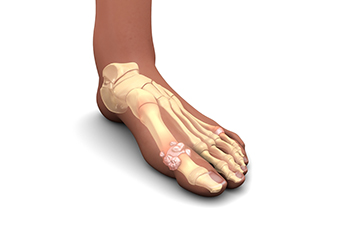
Gout is a type of arthritis notorious for its sudden and excruciating pain. Gout typically targets one joint at a time, and commonly strikes in the big toe joint. Flares, which are periods of intense symptoms, alternate with remission phases. The primary culprit behind gout is an excess of uric acid in the body, which forms crystals that accumulate in joints, fluids, and tissues, sparking inflammation. While gout has no cure, it can be effectively managed with medication and certain lifestyle adjustments. Diagnosis by a podiatrist usually occurs during a flare up, involving symptom assessment, physical examination, and lab tests to detect uric acid crystals. Seeking diagnosis and treatment from a podiatrist is important due to gout’s nonspecific symptoms that resemble other inflammatory disorders. Treatment typically involves pain management during flare ups with nonsteroidal anti-inflammatory drugs, NSAIDs, or colchicine. Other preventive measures can include dietary changes to eliminate foods rich in purines and weight management to reduce future attacks and complications. If you are experiencing symptoms like sudden joint pain or swelling, especially in the big toe, it is suggested that you schedule an appointment with a podiatrist.
Gout is a painful condition that can be treated. If you are seeking treatment, contact Shawn Echard, DPM from Laurel Podiatry LLC. Our practitioner will treat your foot and ankle needs.
What Is Gout?
Gout is a form of arthritis that is characterized by sudden, severe attacks of pain, redness, and tenderness in the joints. The condition usually affects the joint at the base of the big toe. A gout attack can occur at any random time, such as the middle of the night while you are asleep.
Symptoms
- Intense Joint Pain - Usually around the large joint of your big toe, and it most severe within the first four to twelve hours
- Lingering Discomfort - Joint discomfort may last from a few days to a few weeks
- Inflammation and Redness -Affected joints may become swollen, tender, warm and red
- Limited Range of Motion - May experience a decrease in joint mobility
Risk Factors
- Genetics - If family members have gout, you’re more likely to have it
- Medications - Diuretic medications can raise uric acid levels
- Gender/Age - Gout is more common in men until the age of 60. It is believed that estrogen protects women until that point
- Diet - Eating red meat and shellfish increases your risk
- Alcohol - Having more than two alcoholic drinks per day increases your risk
- Obesity - Obese people are at a higher risk for gout
Prior to visiting your podiatrist to receive treatment for gout, there are a few things you should do beforehand. If you have gout you should write down your symptoms--including when they started and how often you experience them, important medical information you may have, and any questions you may have. Writing down these three things will help your podiatrist in assessing your specific situation so that he or she may provide the best route of treatment for you.
If you have any questions, please feel free to contact our offices located in Greensburg and Somerset, PA . We offer the newest diagnostic and treatment technologies for all your foot care needs.
